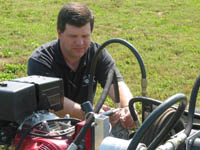New Testing Facility Puts UK in Forefront
New Testing Facility Puts UK in Forefront

Helping farmers do the right thing in the right place at the right time. That’s the goal of the University of Kentucky College of Agriculture’s new GPS testing facility at Spindletop Farm.
The general concept behind the growing field of precision agriculture is the recognition that a farm field is not homogenous. Using GPS (global positioning system) technology to target specific areas, farmers can control chemical and fertilizer amounts better, thereby saving money and improving yields.
Tim Stombaugh, UK associate professor in biosystems and agricultural engineering, is developing the new testing facility that will ultimately help GPS manufacturers in developing the pinpoint accuracy that will enable farmers to correctly diagnose their fields’ needs.
“When somebody goes out to buy a GPS receiver to be used in agriculture, a manufacturer will tell them the accuracy. But you read deep enough and that accuracy is based on a static test,” Stombaugh said. “In agriculture we’re going to take that receiver and put it on a machine that’s moving across the field. So you have this dynamic motion and we don’t know -- is that receiver going to perform to that same level of accuracy while it’s moving as it does when it’s still?”
The College of Agriculture facility is designed to test GPS accuracy in a dynamic sense. Stombaugh explained that the closed track, made of approximately 1,000 feet of I-beam, replicates the typical movement of farm equipment across a field, including parallel straight passes and a headland turn, as well as turns of varying radii that simulate the contour of a Kentucky field.
The facility is attracting international attention. “We have people from all over the world who have come together – manufacturers, academic types – to try to say, ‘Okay, how do we define dynamic accuracy of GPS? What are some terms? What are things that are critical to the farmers?’ So that’s part of an ongoing effort right now and we’re going back and forth developing this international standard,” he said. “This facility is really a premiere test facility in the world. It’s really become world recognized as a unique facility with the capabilities to test these receivers in an agricultural type setting.”
The facility is nearly two years old. Much of that time researchers have spent fine-tuning and improving the system. Stombaugh anticipates that within another year they will begin to ramp up testing. In the meantime, research continues on developing a system that is even better than GPS so that testing can reveal the quality of a GPS system.
Stombaugh said the first effort was to work with the manufacturers.
“We look at some data, we take it back to the manufacturers and they’re very open,” he explained. “They say, ‘Wow, we can fine-tune this and make it a little bit better.’ We get the respect from the industry because they’re putting a better product out to the farmers.”
The GPS testing facility has become a valued source of information for both farmers and manufacturers, he said. “We really help the manufacturers to make a good product and we help the farmers to be able to interpret what the manufacturers are saying about their products so they know what they can realistically do with this technology.”
The better the product, the more opportunity farmers have to cut costs and produce higher yields. At the present, GPS technology is available to farmers in a range of prices, from $2,000 to $50,000. Even GPS receivers costing as little as $100 are useful for some precision agriculture applications. Stombaugh said that lower-end systems such as light bar steering technology can end up saving farmers a significant amount.
“Because you’re not overlapping, because you’re driving more accurately, then you’ll actually be able to reduce the amount of chemicals used,” he said. “When you tell a farmer ‘we’re going to cut your fertilizer and chemical bills by 5 percent just by driving more accurately,’ they can justify a several thousand dollar piece of equipment to do that.”
